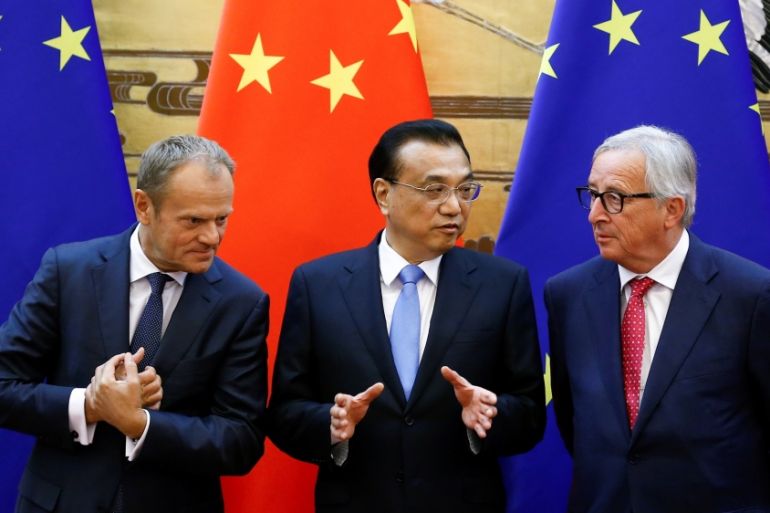Will Trump’s tariffs push the EU and China closer together?
Both the EU and China have vowed to respond to Trump’s protectionist policies.

Last week, leaders from the European Union (EU) met their Chinese counterparts in a key 2-day summit in Beijing and pledged to deepen the bloc’s relationship with China against the backdrop of increasing uncertainty in their relationship with the United States.
The Beijing summit took place as US President Donald Trump held a controversial joint press conference with Russia’s Vladimir Putin in Helsinki. The summit also followed a tense NATO meeting last week, where Trump appeared content to elevate his chastisement of Washington’s most trusted allies and security partners – most of them in Europe.
Keep reading
list of 4 itemsAre more European nations finally moving to recognise Palestine statehood?
EU lawmakers approve sweeping overhaul of asylum and migration rules
EU Parliament committee urges probe after Al Jazeera Senegal investigation
In addition to all this, the Trans-Atlantic relationship has been further frayed with a toxic battle over trade – with the Trump administration imposing heavy tariffs on steel and aluminium imports from the EU (in addition to those from other allies, including Canada and Japan).
China is also feeling the bite from Washington’s protectionist approach, with the Trump administration levying a 25 percent tariff on $34bn of Chinese goods and also listing an additional $200bn that may be subjected to a 10 percent tariff. Beijing has been targeted – largely for good reason – for its unfair trade practices such as its dumping of subsidised goods – such as low-grade steel – on the US market. Washington has also called out Beijing for its theft of intellectual property and proliferation of counterfeit goods.
Regarding trade with China, the Trump administration was right to say that the playing field had been unfair for the US for decades. However, the crude articulation of this sentiment – through high tariffs and protectionist brinkmanship – carries deep economic risks and has already helped fuel a narrative in Beijing that the US – not China – is the real pariah when it comes to international trade rules.
Further bolstering this point of view is the fact that the Trump administration has included its closest allies – the EU, Japan and Canada – in this protectionist net. Earlier this week, the US aided these sentiments even further by announcing that it would be launching dispute actions in the World Trade Organization (WTO) against five separate parties, including the EU and China.
So has this coalescence of concerns on the Trump administration’s approach to trade served as a driver for stronger relations between Europe and China? The short answer is no. While Beijing continues to relish the opportunity to exploit fissures in the US’ alliance network and nurture discussions on waning US credibility, the EU is far from making a decision on elevating disagreements with Washington into something larger or overtly siding with Beijing in a united bloc to oppose the moves. This was made clear during last week’s summit beyond the usual pomp and ceremony of the summitry.
In a joint statement released after the summit, both sides papered over long-standing differences on similar irritants – such as dumping, countervailing and intellectual property theft – to that of the US-China trade relationship. And, while both sides opposed “unilateralism” and “protectionism” – a clear message to Trump – they also failed to agree on systemic hurdles in their own trade and investment relationship.
|
|
Rather than pushing Beijing on crucial areas such as poor market access for EU firms in China, unfair investment environment and low regulations on intellectual property, Brussels merely “took note” of China’s pledges to “ensure a level playing field”. In other words, talk continues to be cheap and balance aspirational in their bilateral investment relations.
An interesting counterpoint to this is the EU’s engagement with Japan – the second largest economy in Asia and third largest globally. Just days after meeting with Chinese leadership in Beijing, European Commission President Jean-Claude Juncker and European Council President Donald Tusk arrived in Tokyo to conclude a landmark Economic Partnership Agreement (EPA) with Japan.
The EPA, which covers nearly a third of global GDP, has set a new standard for mega free trade deals (alongside the Comprehensive and Progressive Agreement for Trans-Pacific Partnership or TPP-11 that was signed earlier this year).
Both deals were shepherded by Japan – not China – and highlight the point that Trump’s protectionist barbs – as detrimental as they are – will not result in a begrudged tilt by Washington’s traditional allies towards Beijing.
Rather, the key democratic states in Asia, Europe and beyond – now led by Japan, the EU, Canada and others – are binding closer together to maintain and promote high standards for international trade and investment.
This point can be demonstrated more clearly through the political-security relationship between Brussels and Beijing. While the two sides just celebrated their 20th EU-China Summit and the 15th anniversary of “global strategic partnership”, the reality remains that they are also far apart on most important political-security matters.
And, while Brussels has been increasingly cautious not to directly point fingers at Beijing for its destabilising activities – for example in the South China Sea – this should not be confused with a convergence of strategic interests or a dissolution of European concerns on Chinese behaviour.
The views expressed in this article are the author’s own and do not necessarily reflect Al Jazeera’s editorial stance.
